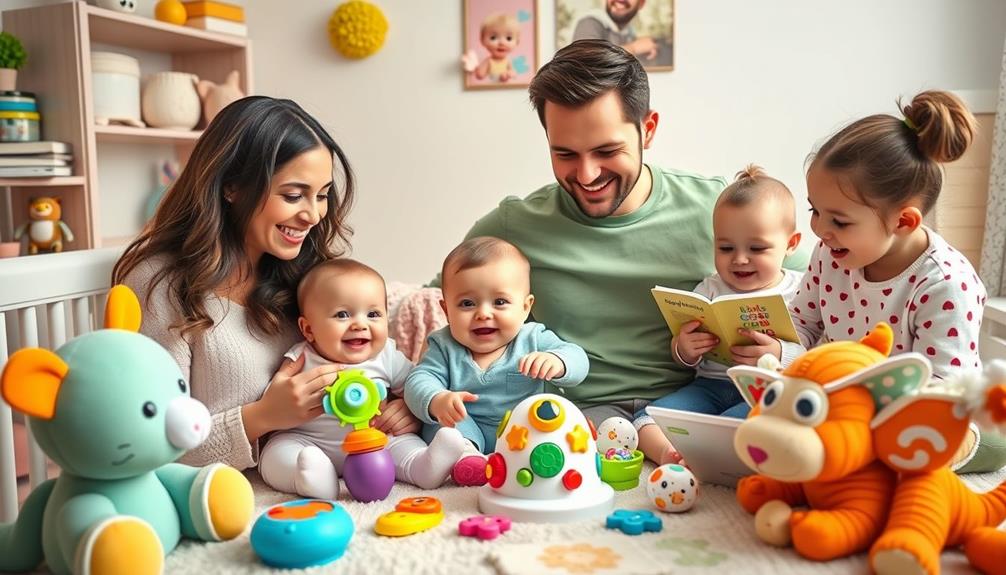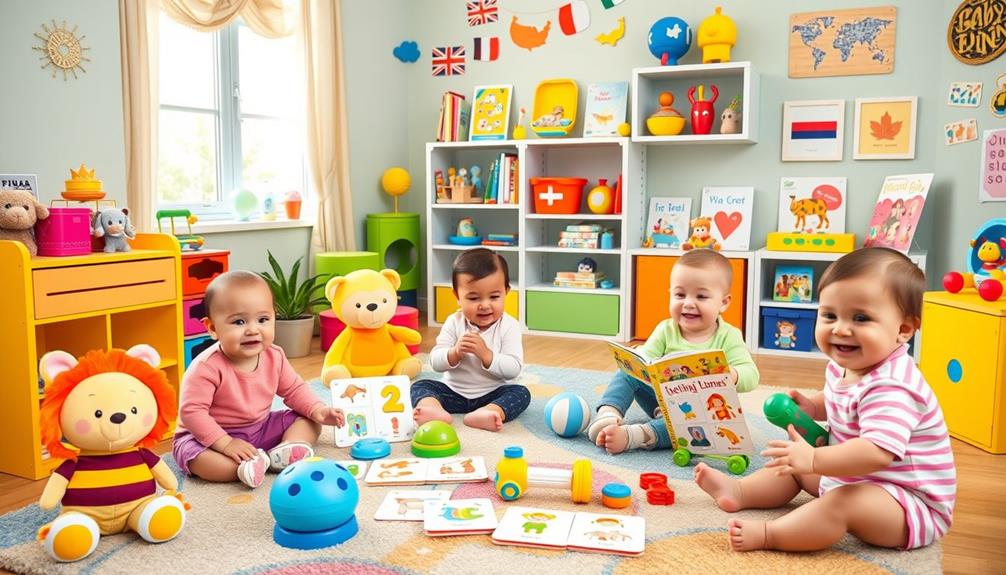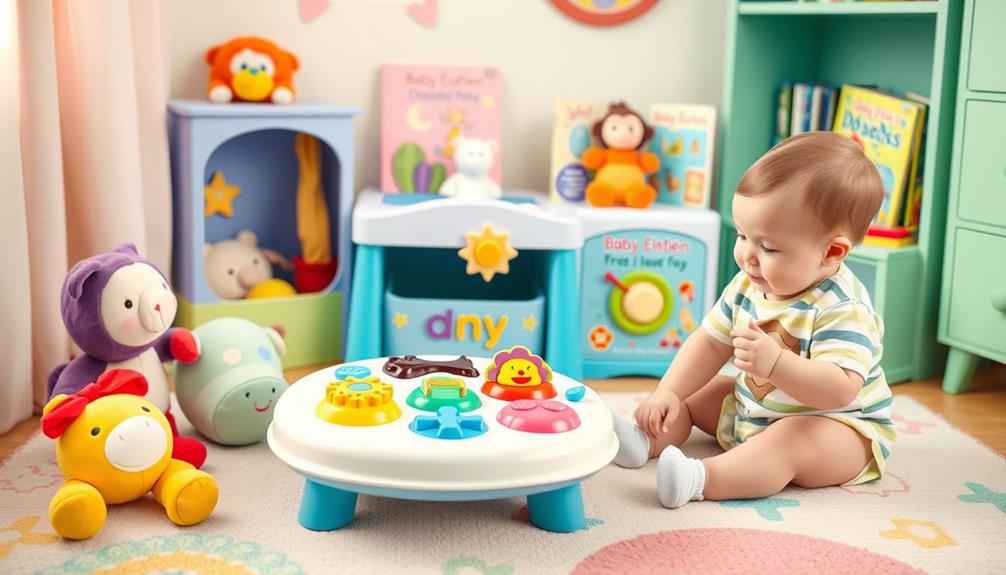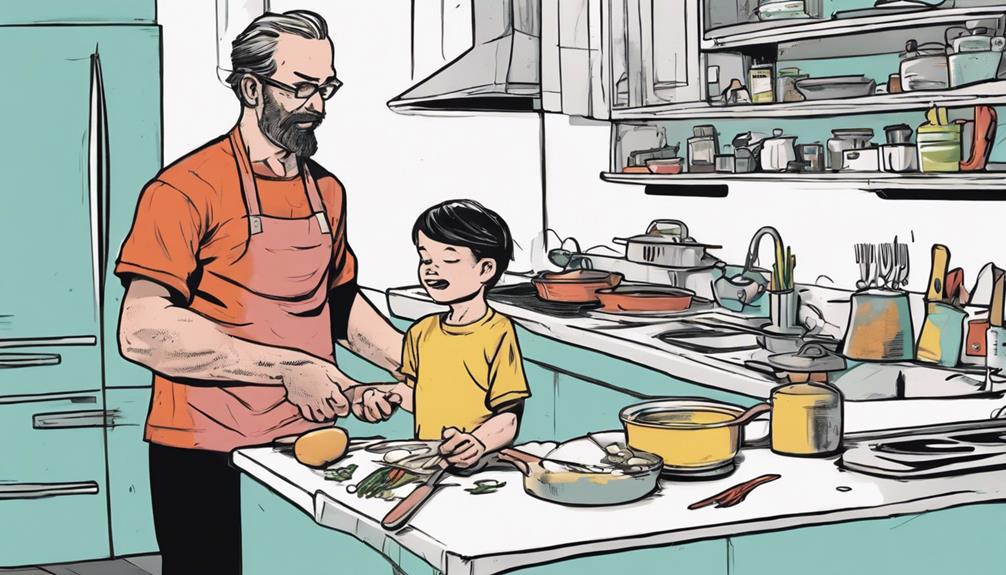If you're looking to boost your child's development, Baby Einstein products are a great choice. Their toys engage your little one with music, colors, and interactive play, promoting cognitive and motor skills. For example, the Together in Tune Piano helps with musical creativity and cognitive growth, while the Discovery Center offers versatile play modes for various milestones. Many products also support multilingual learning, making them even more valuable. Plus, they're designed with safety and durability in mind. Curious about which specific items stand out? Stick around to uncover more insights on the best Baby Einstein products for your family.
Key Takeaways
- Baby Einstein products enhance cognitive and motor skills through interactive play, combining traditional materials with modern technology for developmental benefits.
- Musical toys like the Together in Tune Piano and Magic Touch Xylophone support fine motor skills and cognitive growth through engaging musical exploration.
- The Discovery Center offers versatile play modes that promote curiosity and support gross motor skill development in children.
- Many toys feature multilingual learning opportunities, fostering early language development and cultural awareness from an early age.
- User experiences emphasize the emotional connections and nostalgic value of Baby Einstein products, making them significant in early childhood development.
Overview of Baby Einstein Products
Baby Einstein offers a variety of products designed to nurture your child's cognitive and motor skills from infancy through toddlerhood. With a commitment to enhancing healthy lifestyle blogs that provide inspiration for families, you'll find an engaging selection that includes musical toys, activity centers, and art tables, all aimed at promoting development.
The Discovery Center stands out with its four versatile modes—walk around, activity table, art table, and floor play—allowing for interactive engagement that grows with your child.
Many Baby Einstein toys feature colorful lights and multilingual learning opportunities, teaching numbers, colors, and sounds in different languages. This enhances early language skills and keeps your little one engaged.
The Together in Tune series brings innovation to the forefront with musical instruments that connect via Bluetooth and use Magic Touch technology. This means your child can explore creativity without the hassle of traditional buttons.
Baby Einstein emphasizes combining traditional materials with modern technology, creating durable yet engaging products that encourage imaginative play and exploration.
With a focus on both fun and learning, Baby Einstein guarantees that your child's playtime is both enjoyable and beneficial, laying the foundation for lifelong skills.
Benefits of Musical Toys

Have you ever wondered how musical toys can impact your child's development? Musical toys from Baby Einstein offer numerous benefits that foster growth in various areas. When your child engages with these toys, they start to grasp cause and effect concepts through interactive play. For instance, as they strike a key or pluck a string, they learn how their actions produce sound, enhancing cognitive development and promoting physical health through movement.
Toys like the Together in Tune Guitar and Magic Touch Xylophone not only improve fine motor skills but also spark creativity as your little one explores different melodies and rhythms. Exposure to classical music through toys like the Baby Einstein Take Along Tunes can further aid in developing language skills, literacy, and emotional regulation.
Innovative features, such as color-coded music sheets in the Together in Tune Piano, offer additional support in musical learning while promoting cognitive growth during playtime. Additionally, toys that blend traditional materials with modern technology, like the Symphony Sounds, cultivate your child's appreciation for art and music, providing a well-rounded developmental experience.
Developmental Milestones Supported
Supporting your child's developmental milestones is essential during their early years, and Baby Einstein products are expertly designed to do just that. These toys target various developmental areas, helping your little one thrive.
| Milestone | Baby Einstein Product Type | Developmental Benefit |
|---|---|---|
| Gross Motor Skills | Activity centers and walkers | Encourages standing, walking, and mobility |
| Fine Motor Skills | Stacking blocks and musical toys | Develops dexterity and coordination |
| Cognitive Development | Sensory toys and exploration kits | Engages senses and promotes exploration |
| Auditory Skills | Musical instruments | Enhances auditory perception and language |
With Baby Einstein, your child can explore their environment while developing important skills. The interactive nature of these toys not only fosters fine motor skills but also supports sensory engagement, vital for cognitive growth. Additionally, the exposure to music enriches their auditory experiences, paving the way for language development.
Furthermore, many of these products encourage social interaction, helping children learn collaboration and emotional skills. By incorporating Baby Einstein into your child's routine, you're setting a strong foundation for their overall development.
User Experiences and Feedback

When you think about Baby Einstein products, you might recall the nostalgic tunes that created memorable moments with your little ones.
Many parents find that these engaging learning experiences not only enrich their children's development but also spark valuable conversations in community support networks.
Engaging quizzes designed to entertain children, like fun personality quizzes, can further enhance these interactions by promoting self-discovery.
Let's explore how these musical memories and shared insights enhance your family's journey with Baby Einstein.
Nostalgic Musical Memories
As parents and grandparents reflect on their experiences with Baby Einstein products, they often find themselves swept up in a wave of nostalgia for the classical melodies that once filled their homes. Many cherish the moments spent bonding with their children over the enchanting tunes, recalling how those melodies sparked curiosity and joy.
Social media communities have become a hub for sharing these nostalgic memories, with users collaborating to identify specific pieces from Baby Einstein toys. This collective effort highlights how the music has left a lasting emotional imprint on families.
It's worth mentioning that while the melodies have evolved over the years, many users feel a strong attachment to those original tunes that shaped their early parenting experiences.
Parents frequently share stories of how the music fostered creativity and cognitive growth in their little ones, emphasizing the brand's significant impact on early childhood development.
However, there's a shared struggle among users to identify all the songs featured in these beloved toys. This ongoing quest showcases Baby Einstein's enduring legacy and the cherished memories tied to its musical offerings, uniting families through a shared soundtrack of their children's early years.
Engaging Learning Experiences
Engaging learning experiences with Baby Einstein products have become a focal point for many parents and grandparents, who appreciate the unique blend of music, colors, and interactive play. These products not only provide entertainment but also foster early childhood development, sparking curiosity and creativity in your little ones.
Many users share nostalgic feelings tied to the melodies and educational content, creating bonding experiences with their children. However, you might find it challenging to identify all the melodies included in these toys. This leads to active online searches and community discussions, where users exchange playlists and resources, enriching everyone's appreciation of classical music.
Here's a quick overview of user experiences:
| Feature | User Feedback | Impact on Learning |
|---|---|---|
| Nostalgic Melodies | Strong emotional connection | Enhances bonding during play |
| Variation in Melodies | Confusion over different versions | Encourages community engagement |
| Interactive Play | Boosts curiosity and creativity | Supports early cognitive development |
| Online Communities | Shared resources and playlists | Fosters collective learning experiences |
These experiences highlight how Baby Einstein products engage children while creating lasting memories for families.
Community Support Networks
Community support networks have blossomed around Baby Einstein products, offering a valuable lifeline for parents and grandparents maneuvering the intricacies of identifying beloved melodies.
In these online communities, you'll find others sharing their experiences and challenges, creating a collaborative atmosphere that's both supportive and informative. Many users express nostalgia, recalling melodies from older versions of the toys, which highlights the emotional connection to the brand.
When you engage in discussions to identify songs, you can tap into resources like Shazam or social media outreach, showcasing a shared passion for classical music education.
The feedback from these communities emphasizes the developmental benefits of Baby Einstein products, with many parents noting enhancements in their children's cognitive and motor skills through interactive play.
You can also benefit from shared playlists and song lists that enhance collective knowledge and appreciation for classical music.
This reinforces the cultural significance of the melodies featured in Baby Einstein toys, creating a deeper connection not just to the products, but to the music itself.
Top Recommended Products

If you're looking for the best educational toys for your little one, Baby Einstein has you covered with options that promote musical exploration and developmental play features.
These toys not only engage your child's senses but also support their cognitive growth through interactive experiences.
Additionally, it's important to remember that just as with dog health and nutrition, selecting safe and suitable toys is essential for your baby's well-being.
Let's explore some top picks that can make learning fun and enjoyable for your baby.
Best Educational Toys
When it comes to educational toys, Baby Einstein offers an impressive lineup that combines fun with learning. One standout product is the Together in Tune Piano™, which uses color-coded music sheets to teach classic tunes. This not only enhances cognitive development but also promotes your child's musical creativity.
Another fantastic option is the Four Fundamentals Wooden Sensory Set. It fosters fine motor skills through engaging stacking blocks and sensory toys, stimulating auditory, visual, and tactile exploration.
If your little one loves guitar sounds, the Together in Tune Guitar is perfect. With Bluetooth connectivity and multiple play modes, it introduces diverse sounds and encourages innovative musical exploration.
For imaginative play, consider the Magic Touch Kitchen. This toy introduces kitchen sounds and melodies while engaging your child with sound effects related to food and cooking, enhancing both language learning and creativity.
Finally, the Discovery Center promotes various developmental skills through its four versatile modes, encouraging curiosity and interactive play to support mobility and creativity.
These educational toys from Baby Einstein not only entertain but also support essential skill development in your child. You'll find them worth every penny!
Musical Exploration Options
Baby Einstein's musical exploration options are perfect for nurturing your child's budding talent and creativity. These products not only entertain but also promote skill development through engaging play.
The Together in Tune Guitar connects to multiple instruments via Bluetooth, offering play modes like Learn, Silly, and Freestyle. This encourages your child to experiment and explore musical creativity.
Meanwhile, the Magic Touch Xylophone features over 30 melodies that inspire your little one to tap and create their own music, helping to develop fine motor skills in the process.
If you're looking for group activities, the Together in Tune Drums™ includes four interactive play modes, making it ideal for social engagement and collaboration among kids.
For a more structured musical experience, the Together in Tune Piano™ uses color-coded music sheets, allowing your child to learn classic tunes while supporting cognitive development.
Lastly, the Four Fundamentals Wooden Sensory Set offers a variety of sensory toys that engage multiple senses, fostering creativity and further enhancing fine motor skills.
With these options, your child can immerse themselves in the world of music while developing essential skills along the way.
Developmental Play Features
Engaging in developmental play is essential for your child's growth, and Baby Einstein offers a range of products designed to stimulate various skills.
These top recommended products stand out for their unique features that encourage cognitive, sensory, and motor development.
- Together in Tune Drums™: With four interactive play modes, these drums promote group play and collaboration, allowing your child to explore music-making with friends.
- Magic Touch Xylophone: This colorful xylophone includes over 30 melodies and sounds. Tapping on it fosters fine motor skills while encouraging creative music exploration.
- Four Fundamentals Wooden Sensory Set: Each toy in this set enhances sensory engagement and dexterity, stimulating your child's auditory, visual, and tactile skills through varied play experiences.
- Together in Tune Piano™: Utilizing color-coded music sheets, this piano helps your child learn classic tunes, supporting cognitive development through engaging music and play.
These Baby Einstein products not only provide fun but also play a crucial role in your child's developmental journey, making them worth considering for your little one's playtime.
Multilingual Learning Features

Multilingual learning features in Baby Einstein products offer a dynamic approach to early childhood education. These toys introduce foundational concepts like numbers, colors, and food in multiple languages, which enhances your child's early language development and cognitive skills.
This approach can be particularly beneficial for children in environments where diverse languages are spoken, as it promotes recognizing dangerous behaviors and cultural awareness from an early age. For instance, the Magic Touch Kitchen engages children with delightful kitchen sounds and melodies while teaching relevant vocabulary in various languages.
The Shopping Basket toy takes learning a step further by incorporating sound effects related to shopping. This creates a fun and interactive way for your little one to learn about everyday items in different languages.
Meanwhile, the Curiosity Tablet features over 150 melodies and sounds, providing a rich auditory environment that supports multilingual learning opportunities.
Innovative Play Technologies

Through innovative play technologies, Baby Einstein products transform the way children engage with learning and creativity. These cutting-edge features not only entertain but also promote developmental skills, making playtime both fun and educational.
By incorporating elements such as yoga for back pain management, parents can also guarantee that their children stay active and healthy while enjoying these interactive toys.
Here are some standout technologies you'll love:
- Bluetooth Connectivity: The Together in Tune Guitar allows multiple instruments to connect, encouraging collaborative play and social interaction among children.
- Magic Touch Technology: With the Magic Touch Xylophone, kids can create music simply by tapping. This intuitive design enhances fine motor skills without the hassle of buttons.
- Interactive Play Modes: The Together in Tune Drums™ offers four modes, letting children explore various musical rhythms and sounds. This promotes group play and creativity in music-making.
- Color-Coded Music Sheets: The Together in Tune Piano™ utilizes color-coded sheets to teach classic tunes, fostering cognitive development and early music literacy in an engaging way.
These innovative technologies not only keep your little ones entertained but also support their growth, making Baby Einstein products a smart choice for parents looking to combine fun with learning.
Safety and Durability Considerations

As you explore the benefits of innovative play technologies in Baby Einstein products, it's equally important to contemplate their safety and durability. Baby Einstein designs prioritize your child's safety, adhering to stringent regulations set by the Consumer Product Safety Commission (CPSC). This commitment guarantees that the toys are safe for infants and toddlers.
Additionally, parents can be reassured that these toys are made from high-quality materials that are non-toxic, which is vital since young children often explore toys with their mouths. You can rest easy knowing the products are made with your child's wellbeing in mind.
Durability is another strong point for Baby Einstein. The toys are constructed from sturdy materials like wood and reinforced plastics, designed to withstand the wear and tear of active play. Many products emphasize longevity, featuring replaceable parts or modular components that adapt as your child grows, extending their usability.
Customer reviews consistently praise the resilience of Baby Einstein toys. Parents note that even after years of use, the toys remain functional and visually appealing.
Comparison of Product Lines

When you're choosing the right Baby Einstein product for your child, it's helpful to understand the variety of product lines available. Each line is designed to promote different aspects of early childhood development, so you can select what best suits your child's needs.
Engaging your child in family activities that promote creativity can further enhance their development alongside these products.
Here's a quick comparison of popular product lines:
- Musical Toys: Items like the Together in Tune Guitar and Magic Touch Xylophone use Bluetooth and touch sensitivity, fostering interactive music-making that engages your little one creatively.
- Activity Centers: The Discovery Center offers four modes—walk around, activity table, art table, and floor play. This versatility adapts as your child grows, encouraging mobility and creativity.
- Educational Toys: Products like the Curiosity Tablet and Magic Touch Kitchen introduce multilingual learning. They expose your child to numbers, colors, and sounds in various languages, enhancing cognitive development.
- Collaborative Play: Toys such as the Together in Tune Drums and Symphony Sounds blend traditional elements with modern technology, ensuring durability while promoting group play and collaboration.
Frequently Asked Questions
Is Baby Einstein Worth It?
Did you know that 90% of a child's brain develops by age five?
When considering if Baby Einstein is worth it, you should reflect on the brand's focus on early childhood development through interactive play. Many parents appreciate how these toys enhance fine motor skills and cognitive growth.
If you're looking for engaging and educational options for your little one, Baby Einstein products could be a valuable addition to your playtime routine.
What Is the Lawsuit Against Baby Einstein?
The lawsuit against Baby Einstein stemmed from claims by the American Academy of Pediatrics in 2006, arguing that the company misled parents into believing its products enhanced cognitive development.
In 2009, Baby Einstein settled, agreeing to remove misleading marketing statements and refund $15 million to affected consumers.
This case emphasized the importance of interactive play for infants, leading Baby Einstein to shift its focus toward promoting active engagement and hands-on play in their products.
Do Programs Like Baby Einstein Actually Work?
Did you know that children exposed to music at an early age can develop better language skills?
While programs like Baby Einstein can introduce your child to classical music and stimulate curiosity, their actual effectiveness in boosting cognitive development is debated.
Critics argue that passive viewing isn't as beneficial as interactive play.
The American Academy of Pediatrics recommends active parental involvement to maximize any potential benefits, suggesting that engagement is key to your child's growth.
What Age Group Is Baby Einstein For?
Baby Einstein products are designed for infants and toddlers, typically catering to kids aged 0 to 36 months.
You'll find toys and activities that support developmental milestones from around six months up to toddler years. For instance, musical toys engage children from age one and up, promoting interactive play.
These products effectively facilitate fine motor skills and sensory exploration, making them perfect for your little one's critical first three years of growth and learning.
Conclusion
In the whirlwind of baby gear, Baby Einstein products shine like superstars! They're not just toys; they're gateways to a world of discovery and joy. With their magical melodies and brain-boosting features, your little one will be a genius before you know it! So, plunge into this enchanting collection and watch your baby giggle, learn, and explore like never before. You won't just be buying toys; you'll be investing in a future filled with wonder and brilliance!










